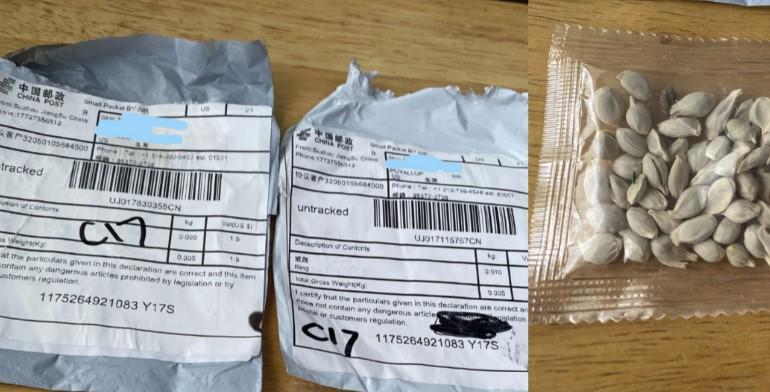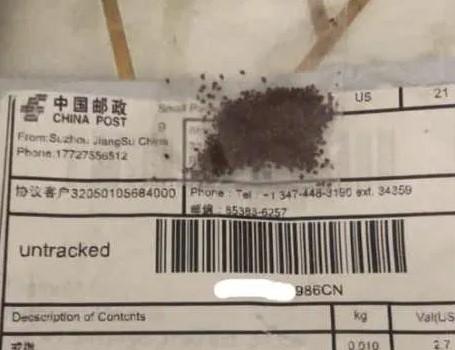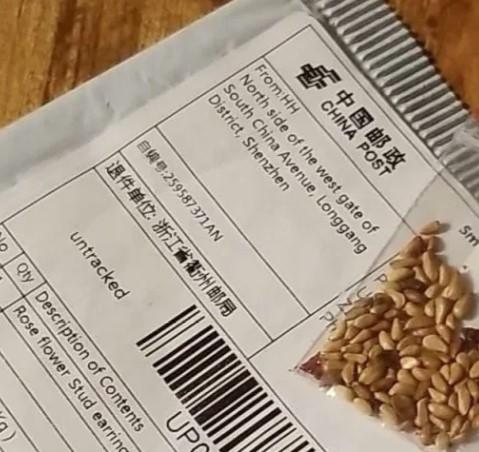The US Has Started To Identify The Mystery Seeds Being Sent From China Tyler Durden Mon, 08/03/2020 - 19:45
It was just about week ago that we highlighted a mysterious trend that was sweeping the U.S.: citizens were receiving unsolicited packages of seeds, with return addresses from China, for apparently no reason at all.
Now, the U.S. has started to identify "14 types of plants" that the seeds belonged to, revealing a “mix of ornamental, fruit and vegetable, herb and weed species,” according to the NY Times. Cabbage, hibiscus, lavender, mint, morning glory, mustard, rose, rosemary and sage have all been identified.
Osama El-Lissy of the U.S. Department of Agriculture Animal and Plant Health Inspection Service said: “This is just a subset of the samples we’ve collected so far.”
Art Gover, a plant science researcher at Penn State University said the "risk is low" of the plants being involved in biological warfare, but that the seeds "can be troublesome because they can introduce problematic weeds and diseases".
Lisa Delissio, a professor of biology at Salem State University in Massachusetts, said: "If any of the unidentified seeds turned out to be invasive species, they could displace native plants and compete for resources and cause harm to the environment, agriculture or human health."
Bernd Blossey, a professor in the department of natural resources at Cornell University commented: “Obviously planting rosemary or thyme in your garden isn’t something that will endanger our environment. But there may be other things in there that have not been identified yet. Any time you gain something unknown, my suggestion is burning them, not even throwing them in the trash.”
As of now, it seems too early to tell whether or not something nefarious is taking place. But, like Blossey says, we wouldn't take any chances either. In our prior report, we suggested the mailings could be some sort of agricultural warfare brewing between the U.S. and China - where agriculture remains a key point of trade tensions - and where a cold war of sorts appears to be bubbling up under the surface.
After multiple reports in the U.S. media regarding the seeds, China's Foreign Ministry responded last week by saying that China Post (the country's state owned mail service) "has strictly followed regulations that ban the sending and receiving of seeds," according to Bloomberg.
Further, Chinese Foreign Ministry spokesman Wang Wenbin says that the parcels were "forged" and "not from China". China has supposedly requested that the U.S. mail the seeds back to China so they could investigate further.
We noted last week that the response is anything but re-assuring. We're not postmaster generals but we find the idea of being able to forge mailing labels - and get products to their final destination - in this day and age where even the decrepit U.S. postal service is mostly digital, as a difficult one.
Recall, we wrote days ago that Americans across the country were starting to report receiving unsolicited packages of different types of seeds that they didn't order - and don't know anything about - at their door. The return address on the packages is always from China.
The Washington State Department of Agriculture wrote about the phenomenon on their Facebook page on July 24, 2020 and said that the seeds are being shipping in packaging that identifies the contents as jewelry. Similar advisories have been issued in Virginia, Utah, Kansas, Arizona and Louisiana.
Facebook users have been adding photos in the comments section of the post sharing photographs of seeds they have received from China. “It’s not a joke. I got some the other day!!!” one user commented, stating that the package identified the contents as a "Rose flower stud earring".
“Look’s like it’s all across the country,” stated an Indiana resident who also received seeds in the mail unsolicited.
At least 40 residents in Utah were said to have been mailed the unsolicited packages, according to the Daily Mail. The Kansas Department of Agriculture and the Arizona Department of Agriculture also addressed the phenomenon, as did the Louisiana Department of Agriculture and Forestry, who said:
"Right now, we are uncertain what types of seeds are in the package. Out of caution, we are urging anyone who receives a package that was not ordered by the recipient, to please call the LDAF immediately. We need to identify the seeds to ensure they do not pose a risk to Louisiana’s agricultural industry or the environment."
There had been similar reports from Virginia's Department of Agriculture and Consumer Services. "The seeds have yet to be identified, but officials speculate that the seeds may be of an invasive plant species and are advising residents not to use them," Fox News reported.
"Taking steps to prevent their introduction is the most effective method of reducing both the risk of invasive species infestations and the cost to control and mitigate those infestations," VDACS wrote in a press release.
Public Asked To Report Receipt of any Unsolicited Packages of Seeds. Learn more: https://t.co/RY9u4nR1QK pic.twitter.com/ZzNaO2ZaYz
— VDACS (@VaAgriculture) July 24, 2020
Twitter is also littered with reports of people receiving these seeds:
We have received 2 of those packages here in Indiana. One from China, and one from Kyrgystan. pic.twitter.com/Fm6CBxf1mD
— Don ⭐⭐⭐ (@SmallTownIndy) July 26, 2020
The Washington State Department of Agriculture has advised people on its Facebook page:
1) DO NOT plant them and if they are in sealed packaging (as in the photo below) don’t open the sealed package.
2) This is known as agricultural smuggling. Report it to USDA and maintain the seeds and packaging until USDA instructs you what to do with the packages and seeds. They may be needed as evidence.
Anyone who has received seeds in the mail can report them to the United States Department of Agriculture by visiting their website here. The site says:
If individuals are aware of the potential smuggling of prohibited exotic fruits, vegetables, or meat products into or through the USA, they can help APHIS by contacting the confidential Antismuggling Hotline number at 800-877-3835 or by sending an Email to SITC.Mail@aphis.usda.gov.
USDA will make every attempt to protect the confidentiality of any information sources during an investigation within the extent of the law.
https://ift.tt/3igIhkD
from ZeroHedge News https://ift.tt/3igIhkD
via IFTTT








0 comments
Post a Comment